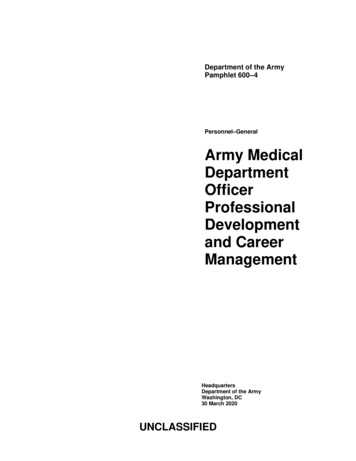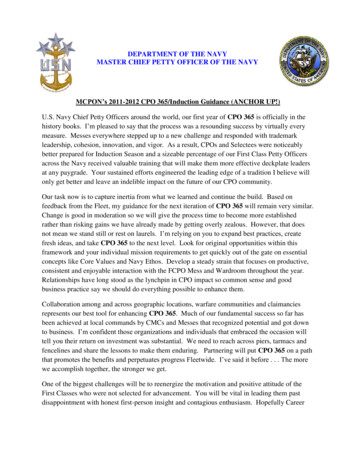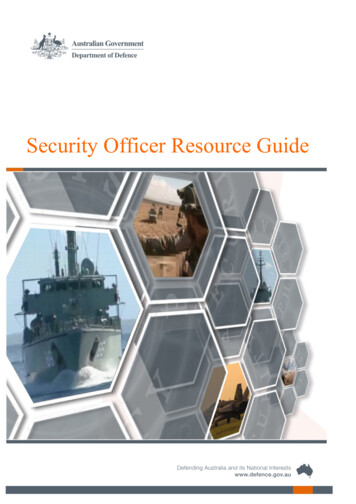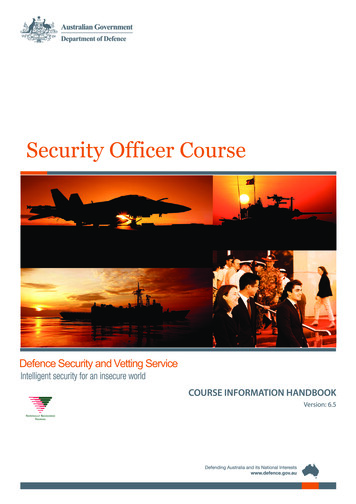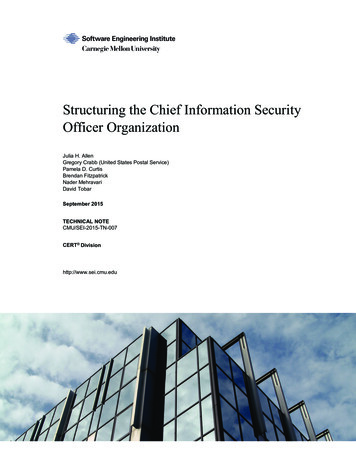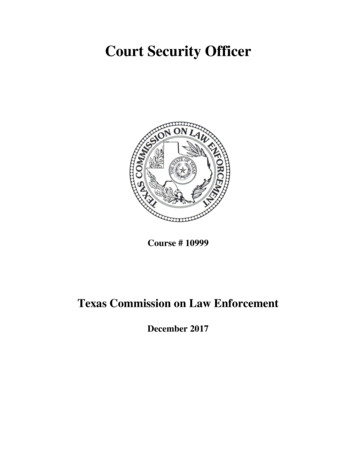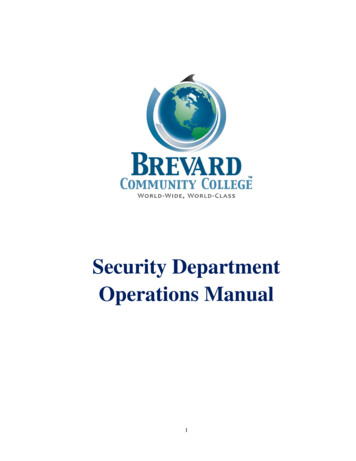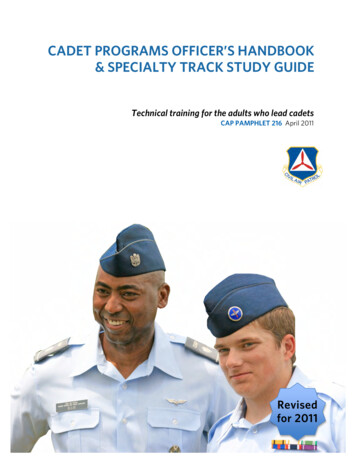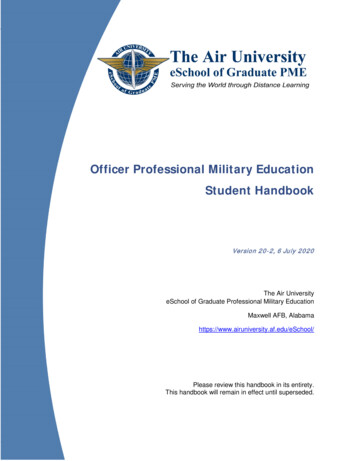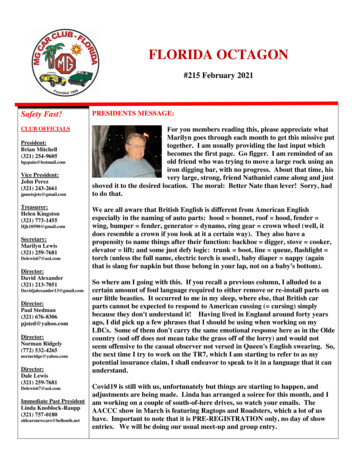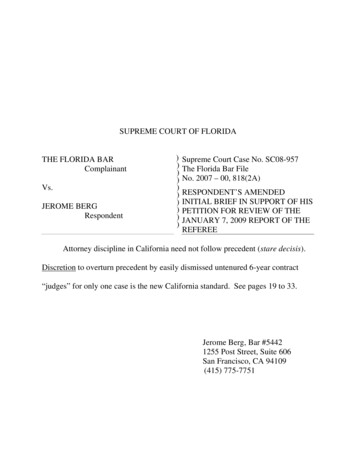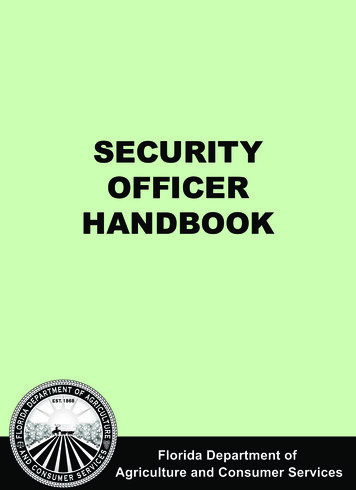
Transcription
SECURITYOFFICERHANDBOOK
Florida Department of Agriculture and Consumer ServicesA message from the Commissioner:The primary responsibility of a licensed security officer is toprotect the property and personal safety of others. Becauselicensed security officers serve in positions of public trust, it isimportant that only qualified and properly trained individualsare licensed as security officers and that the business practicesof the security industry as a whole are consistent with the publicgood.The Florida Department of Agriculture and Consumer Serviceshas the statutory responsibility under Chapter 493, FloridaStatutes, of regulating the security industry. In carrying out thisresponsibility, the department’s objective is to promote publicsafety by ensuring that individuals and agencies comply with thelaw.Knowledge of the law is essential to compliance. Therefore, thedepartment provides this handbook to assist those of you whowork in the security industry in gaining a basic understandingof the fundamental requirements of Chapter 493. I hope thispublication will prove to be a source of helpful guidance to you.Sincerely,Nicole “Nikki” FriedCommissioneri
PREFACEThis document explains the legal authority, rights, andobligations of applicants and licensees for security officerlicenses in Florida.Citations to Florida Statutes (F.S.) and the FloridaAdministrative Code (F.A.C.) are included in this document forreference to the precise language presented in law and rule.For further information, see Chapter 493, F.S., and Chapter5N-1, F.A.C.ii
TABLE OF CONTENTSSECURITY GUIDELINESTITLE/SUBJECTI.LawII. Regulated ActivityIII. Types of LicensesIV. Training RequirementsV. FirearmsVI. Firearms TrainingVII. Use of ForceVIII. Uniforms and Identification CardsIX. Insurance RequirementsX. Applying for a LicenseXI. Cancellation/Inactivation of LicenseXII. Agency AdvertisementsXIII. Use of State Seal ProhibitedXIV. Other Prohibited ActsXV. BadgesXVI. Vehicle LightsXVII. Unlawful Symbols of AuthorityXVIII. FDACS, Division of LicensingXIX. Disciplinary Action/PenaltiesXX. Duty to Report ArrestsXXI. Regional 1
SECURITY GUIDELINESI.LAW – Chapter 493, Florida StatutesThe following explanations of the law are intended toassist applicants and licensees in understanding the basicrequirements and restrictions of Chapter 493, Florida Statutes.Please note that this handbook does not constitute theentirety of the law. Individuals seeking a more comprehensiveunderstanding of the law are directed to carefully read andstudy Chapter 493, Florida Statutes, as well as Chapter 5N-1,Florida Administrative Code.II.REGULATED ACTIVITY — Private SecurityDefinition — Providing, or advertising as providing, the serviceof guarding persons or property for compensation.Sections 493.6101(18) and (19), F.S.III. TYPES OF LICENSES Security Officer — Class “D” license — Any individualwho performs security services must have a Class “D” SecurityOfficer License and must own or be employed by a licensedClass “B” Security Agency or branch office. Class “D” licenseesmay not personally enter into subcontractor agreements withany licensed agency or other business entity.Sections 493.6301(4) and (5), F.S. Statewide Firearm License — Class “G” license — Anyindividual who carries a firearm while on duty must have aClass “G” license in addition to his Class “D” or manager’slicense.See “Firearms,” Section V Security Agency — Class “B” license — Any businesswhich advertises as, or is engaged in, the business of furnishingsecurity services, armored car services, or transportingprisoners for compensation is a security agency and must1
possess a Class “B” Security Agency License. Class “B” agenciesmay enter into subcontractor agreements with other licensedagencies.Agencies must notify the division of any changes in officers orownership within 5 working days of the change. Agencies mustnotify the division of any changes in physical location within10 working days of the change. Agency licenses that reflectincorrect information because such changes have not beenreported, are in violation of Chapter 493, F.S.Sections 493.6106(2)(a), 493.6112(1), and 493.6301(1) Branch Office — Class “BB” license — Each additionallocation of an agency where security business is activelyconducted must obtain a Class “BB” Branch Office License.Section 493.6301(2), F.S. Agency Managers — Class “M” or “MB” license — Anyperson who directs the activities of licensed security officersat any agency or branch office must have a Class “M” or Class“MB” Manager License. A Class “D” licensee, who has been solicensed for a minimum of two (2) years, may be designated asthe manager, in which case the Class “M” or “MB” license is notrequired. The manager assigned to an agency or branch officemust operate primarily from the location for which he has beendesignated as manager. Each licensed location must have adesignated, properly licensed manager and a licensed managermay only be designated as manager for one location.Section 493.6301(3)(a), F.S. Security Officer Instructor — Class “DI” license — Anyindividual who teaches or instructs at a Class “DS” SecurityOfficer School or Training Facility shall have a Class “DI”license, except instructors who are full-time faculty members.Instructors who are full-time faculty members and who teachexclusively for public educational facilities are exempt fromthis requirement.Section 493.6301(8), F.S.2
5N-1.134(3)(b), F.A.C. Security Officer School — Class “DS” license — Any schoolor training facility that teaches or instructs applicants forClass “D” licensure must have a Class “DS” license except thoseschools that are exempt pursuant to 5N-1.134(3)(a), F.A.C.Section 493.6301(7), F.S.5N-1.134(3)(a), F.A.C. Firearms Instructor — Class “K” license — Any individualwho provides classroom or range instruction to applicants fora Class “G” license must have a Class “K” license. Class “K”licensees must follow the standards and procedures in theDivision of Licensing Firearms Training Manual.Section 493.6115(7), F.S. Unless the license is suspended or revoked by the Divisionof Licensing, licenses are valid for 2 years, except for theClass “B” Security Agency license, the Class “BB” or “AB”agency branch license, and the Class “K” Firearms Instructorlicense, which are valid for 3 years. The licensee is responsiblefor renewing his or her license on time and should apply forrenewal 60-90 days prior to expiration. Although the divisionsends the licensee a renewal notice at least 90 days prior tothe expiration date of the license, the licensee is ultimatelyresponsible for renewing his or her license in a timely mannereven if the renewal notice was not received. The Class “D”Security Officer License must be in the possession of thelicensee while on duty. An armed security officer must alsohave the Class “G” Statewide Firearm License in his or herpossession while on duty in an armed capacity.Sections 493.6111(1) and (2), and 493.6113 F.S.IV. TRAINING REQUIREMENTS An applicant for a Class “D” license must submit proofof successful completion of a minimum of 40 hours ofprofessional training at a school or training facility licensed bythe department.3
An applicant for a Class “DI” Security Officer InstructorLicense shall have the following qualifications: Be at least eighteen (18) years old;AND Can evidence a high school diploma or a GEDcertificate;AND Is licensed as a Class “D” security officer and hasbeen so licensed not less than 3 years within the 5-yearperiod immediately preceding application;OR Can evidence an associate degree from a juniorcollege or community college with a major course of studyin criminology, criminal justice, police science, or othercourse of study related to law enforcement or security andis currently licensed as a security officer and has been solicensed for not less than 1 year;OR Can evidence a bachelor’s, master’s, or doctoratedegree from a college or university with a major courseof study in education, criminology, criminal justice,police science, law or other course of study related to lawenforcement or security.OR Can evidence a certificate of completion from afederal, state, county or municipal law enforcementacademy or training facility which is comparable in hoursand curriculum to the training established by the FloridaCriminal Justice Standards and Training Commission orthe Department of Education as acceptable to meet lawenforcement officer, correctional officer or correctionalprobation officer minimum standards;OR Can evidence having served not less than 1 year on4
active duty as a military policeman, security police officer,or in other military law enforcement duty;OR Is currently licensed as a Class “M” office manager ora Class “MB” security office manager and is serving or hasserved in a licensed management position. An applicant for a Class “DI” Security Officer Instructormay qualify for licensure to teach only in specific subject areasrelating to his or her professional training and experience who: Is licensed as a nurse, emergency medical technicianor paramedic, or is otherwise professionally trained andcertified in emergency medical procedures;OR Has been certified as an instructor by the AmericanRed Cross, American Heart Association or othersimilar nationally recognized health and human careorganization;OR Is a certified firefighter.5N-1.138, F.A.C. An applicant for a Class “K” Firearms Instructor Licensemust have one of the following certificates: The Florida Criminal Justice Standards andTraining Commission Instructor Certificate and writtenconfirmation by the commission that the applicantpossesses an active firearms certification;OR The National Rifle Association Private SecurityFirearm Instructor Certificate.OR A firearms instructor certificate issued by a federallaw enforcement agency.Section 493.6105(6), F.S.5
An applicant for the Class “M” license must pass anexamination that covers the provisions of Chapter 493, F.S.This examination is administered by the department or bya provider approved by the department. The applicant mustpass the examination prior to applying for licensure; proof ofsuccessful completion of the exam must be submitted with theapplication.If a Class “M” license becomes invalid as a result of expirationor administrative action and remains invalid for more than oneyear, the person applying for re-licensure must take and passthe examination a second time.Sections 493.6203(5)(a) and (b), F.S.V.FIREARMS Class “G” Statewide Firearm License — A Class “D”Security Officer or Class “M” or “MB” Security Agency Managerwho also possesses a Class “G” Statewide Firearm Licensemay carry a firearm while on duty. While performing dutiesauthorized under this chapter, a Class “G” license holder cancarry only the following handguns: a .38 caliber revolver;a .380 caliber or 9-millimeter semiautomatic pistol; a .357caliber revolver with .38-caliber ammunition; a .40 caliberhandgun; or a .45 ACP handgun.Sections 493.6115(2), (5), and (6), F.S. Approval of Other Firearms – A licensed security officeror security agency manager who holds a Class “G” license cancarry a 12-gauge pump-action shotgun or a semiautomatic rifleas a secondary weapon, to carry or remain in the vehicle, inthe performance of regulated duties ONLY IN THE LIMITEDCIRCUMSTANCES IDENTIFIED IN RULE 5N-1.131, F.A.C.These limited circumstances are discussed below: The use of 12-gauge pump-action shotguns orsemiautomatic rifles as secondary weapons is restricted tocircumstances involving fulfillment of a security agency’s6
contractual obligations either to a government facilityor to a critical infrastructure facility where the contractrequires the use of these weapons. The use of 12-gauge pump-action shotguns assecondary weapons, where the shotgun remainsin a vehicle for use only if needed, is restricted tocircumstances in connection with an agency’s providing:armored car services to replenish automated tellermachines; courier services to transport large amountsof currency and/or valuables; services related to theguarding of and/or transportation of prisoners; and, closeprotection bodyguard services. The use of select-fire firearms is restricted tocircumstances involving the delivery of services by alicensed security and private investigative agency directlyto the United States government when the governmentcontract specifically requires the use of these weapons.Each security agency’s management must review this rule anddetermine the applicability to the agency’s operations.Section 493.6115(6), F.S.Rule 5N-1.131, F.A.C. A Class “G” license holder may not carry more than twofirearms upon his or her person when performing regulatedduties, and the licensee is restricted from carrying a firearm ofany specific type or caliber unless he or she has been properlytrained by a Class “K” firearms instructor in the use of thatfirearm.Sections 493.6115(6), F.S. Firearms and Ammunition — Licensed agencies shallallow licensed employees to use only standard (factory)ammunition of a type and load which is appropriate for thelocation and duty requirements of armed employees with theexception of the following types of prohibited ammunition: Glaser-type or any other pre-fragmented-type bullets7
Exploding bullets Full metal jacket (fmj)/full metal case (fmc) bulletsexcept in semiautomatic firearms Teflon-coated (ktw-type) or any other type of armorpiercing bullets Full wadcutter bullets (except on firing range) Reloads (except on firing range)Rule 5N-1.129, F.A.C. A Class “D” Security Officer licensee who also holds avalid Class “G” Statewide Firearm license shall not carry afirearm while on duty unless doing so is authorized by her orhis employer as being required by and in connection with thoseduties. A licensed security agency shall not furnish its employeesa weapon or firearm unless the carrying of a weapon or firearmis
Security Officer School — Class “DS” license — Any school or training facility that teaches or instructs applicants for Class “D” licensure must have a Class “DS” license except those schools that are exempt pursuant to 5N-1.134(3)(a), F.A.C. Section 493.6301(7), F.S. 5N-1.134(3)(a), F.A.C. Firearms Instructor — Class “K” license — Any individual who provides .File Size: 916KBPage Count: 38
